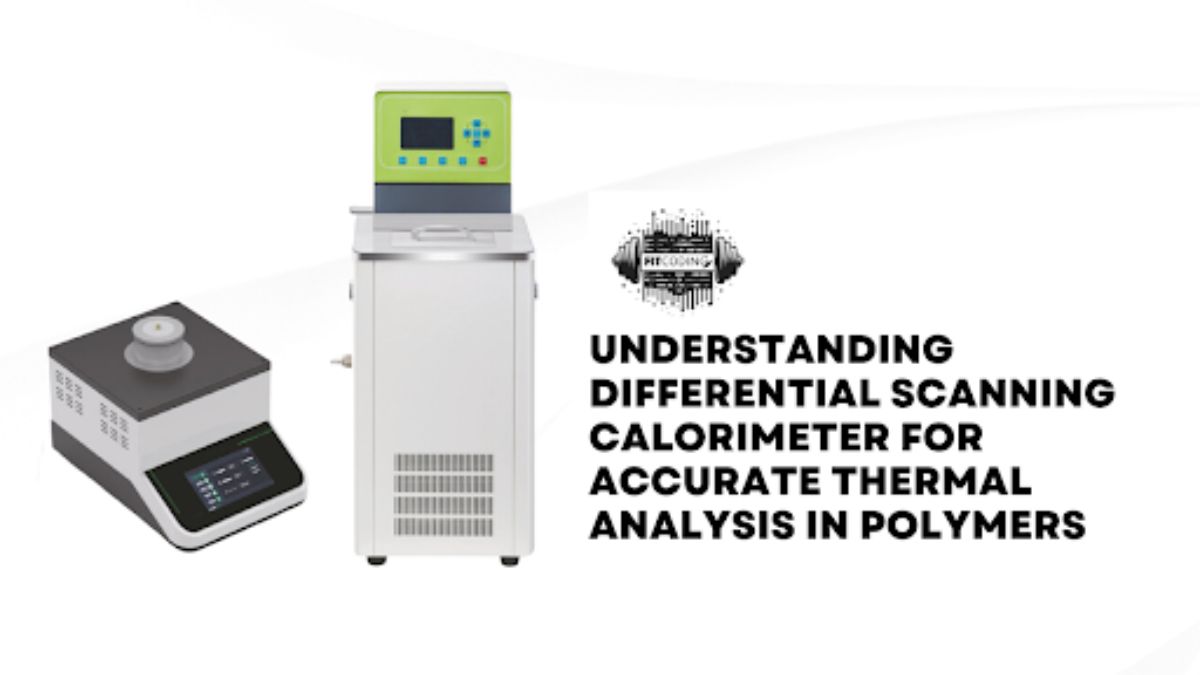Polymers are crucial in many industries, from packaging to automotive and electronics. Their thermal properties directly impact how well they perform. To ensure quality, it’s essential to analyze their behavior under changing temperatures. One of the most widely used tools for this is the Differential Scanning Calorimeter (DSC), which provides insights into how materials respond to heat.
Ever wonder how materials like plastics are tested for stability and performance? That’s where the differential scanning calorimeter comes in. Let’s explore how this tool is used in thermal analysis and why it’s indispensable for polymers.
What is a Differential Scanning Calorimeter?
The DSC Differential Scanning Calorimeter measures the heat flow in a material as it undergoes temperature changes. It helps you understand how much heat is absorbed or released during transitions like melting, crystallization, or glass transition in polymers.
Imagine testing a plastic sample. As it’s heated, the calorimeter detects shifts in heat flow, which reveals the material’s behavior. This data provides key insights into the polymer’s stability and properties. Curious how this all works? Let’s dig into the basic principle behind the instrument.
The Principle Behind the Differential Scanning Calorimeter
The operation of a calorimeter is quite simple. It measures the difference in heat flow between a sample and a reference material under identical temperature conditions. When the polymer undergoes a thermal transition—such as melting or crystallization—the heat absorbed or released deviates from the reference.
For example, when a polymer melts, it absorbs heat, which the calorimeter detects. This results in a thermogram, a curve that reveals important thermal properties like melting point and crystallization temperature. These insights help you determine how a polymer behaves under heat and cold, which is crucial for performance testing.
Thermal analysis data allows manufacturers to choose the right materials for specific applications. Are you beginning to see why differential scanning calorimeter manufacturers prioritize precision?
Why Thermal Analysis is Important for Polymers
Thermal stability is critical when working with polymers. They must withstand heat without degrading or losing key properties. This makes thermal analysis essential for ensuring your materials can handle environmental conditions.
For instance, if you manufacture food packaging, the plastic must remain stable under heat. The calorimeter can quickly determine if the chosen polymer will perform as needed. Testing reveals if the material will melt, crystallize, or undergo changes at critical temperatures.
It’s also valuable in research and development. Thermal analysis helps scientists understand the behaviors of new materials, ensuring that only the most stable and reliable polymers are used in production.
Do you already use thermal analysis for quality control? If not, it might be time to consider incorporating it into your workflow.
Common Applications in Polymer Testing
Thermal analysis is widely used in industries where polymers are critical. From consumer goods to aerospace, this tool informs decisions about material selection and design. Here are some typical applications:
- Quality Control: Ensures materials meet performance standards and stability requirements.
- Research & Development: Assists in creating new materials with specific thermal properties.
- Failure Analysis: Helps identify causes of material failure.
- Phase Transitions: Measures temperatures for melting, crystallization, and glass transitions.
- Curing Processes: Tracks heat flow during curing reactions or cross-linking.
Do any of these applications match your industry’s needs? The insights gained from thermal analysis help you fine-tune your material choices and designs, ensuring product success.
Benefits of Using Thermal Analysis in Polymers
Using this method offers several benefits, especially when working with polymers. It’s precise, repeatable, and easy to use. Here are some key advantages:
- Accurate Measurements: Detects even small changes in heat flow during phase transitions.
- Easy to Operate: User-friendly interface with clear outputs.
- Versatility: Suitable for a wide range of materials, including blends and composites.
- Broad Temperature Range: Can test materials at various temperatures, making it ideal for multiple applications.
Whether you are focused on product development or quality control, thermal analysis offers the data you need. It empowers you to make decisions based on reliable, accurate thermal behavior.
Are you currently using thermal analysis in your testing processes? If not, it might be the key to improving the performance and reliability of your materials.
How to Choose the Right Differential Scanning Calorimeter
Not all calorimeters are created equal. When choosing the right tool for your company, several factors should be considered: accuracy, temperature range, and ease of use. Some differential scanning calorimeter manufacturers offer advanced models that include automatic calibration and high sensitivity, which might be ideal depending on your needs.
Before making a purchase, ask yourself:
- Does the instrument offer the right temperature range for my applications?
- How sensitive does it need to be to detect transitions in my materials?
- How much automation will benefit my testing process?
Investing in the right equipment ensures you get the most accurate and relevant data, which can improve your overall material testing. Selecting the correct tool gives you greater control over product development and quality assurance.
Final Thought
Thermal analysis through Differential Scanning Calorimeter offers more than just data—it provides a deeper understanding of how materials behave in real-world scenarios. For professionals working with polymers, this insight is invaluable, whether you’re developing new products, conducting research, or ensuring quality control.
If you’re eager to explore the full scope of what DSC can offer, we highly recommend Qualitest North America. Their guide provides detailed insights into how DSC can optimize your testing processes, and their extensive range of DSC models ensures you’ll find the right fit for your needs.
Discover how Qualitest can help you harness the power of thermal analysis for better material performance and reliability!











